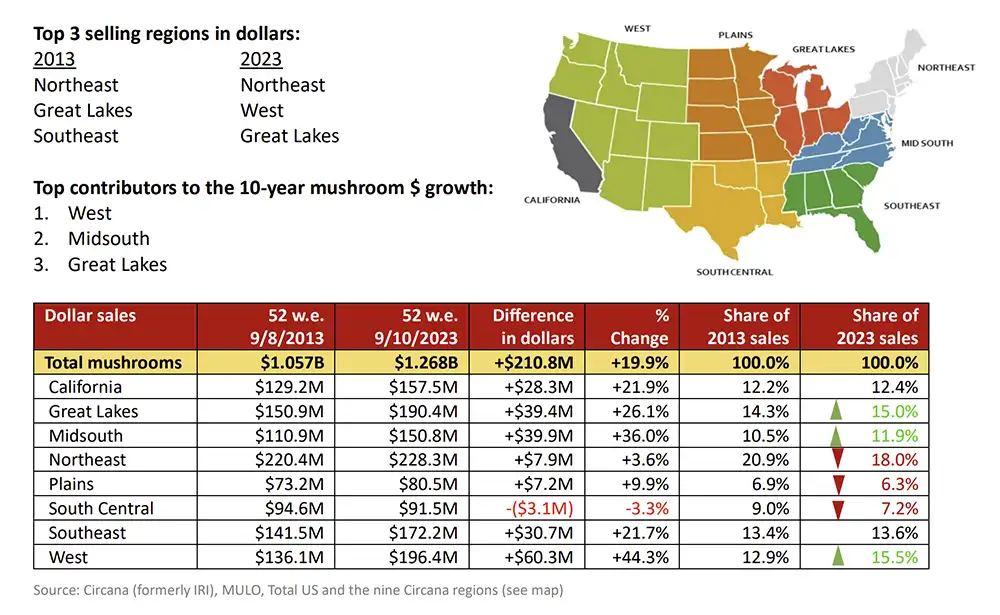Nov. 8, 2023 – Mushrooms aren’t just having a moment. They are a movement, whether showing up in fashion and housewares, featured as a functional ingredient in beverages and snacks or served up fresh in home kitchens and restaurants nationwide.
Now, a new report from the Mushroom Council BB #:161860 reveals long-term shifts in consumer preferences for fresh mushrooms, providing valuable insights to growers, retailers and menu developers as they seek to seize consumers’ enduring passion and interest for mushrooms.
Compiled by retail analyst Anne-Marie Roerink, 210 Analytics, LLC, “Ten-Year Trends in Fresh Mushroom Sales” explores trends in dollar and volume retail sales, types sold, regional differences, thereby “offering decision-makers at grocers and restaurants a much cleaner look at consumption habits beyond the disruptions at retail and foodservice we began realizing in March 2020,” said Roerink.
Among the findings:
A Shift to Brown
While white mushrooms remain the largest seller in retail, the 10-year comparison shows a long-term shift from white buttons to crimini/baby bellas and portabellas.
In 2013, white button mushrooms made up 66% of total mushroom retail dollars. Ten years later, this share is 52%. Brown mushrooms i.e., criminis and portabellas, increased from 30% of fresh mushroom dollar sales in 2013 to 42% in 2023. Brown mushrooms gained nearly $213 million in sales, reflecting a 67.4% increase.”
“Browns have earned substantial momentum, likely driven by myriad factors including consumers generally seeking richer flavors in their favorite dishes,” Roerink noted.
Sliced Sees Steady Growth
“Whether it’s from consumers’ growing interest in stir-fry meals, adding veggies to sauces, or simply a desire for convenience, sliced mushrooms sales have steadily risen in share compared to whole mushrooms,” Roerink noted. “Producers and retailers should take note of this, particularly with browns.”
In white mushrooms, the share of sliced has increased from 44% in 2013 to 48% in 2023. In browns, the growth of sliced is even more pronounced with the share moving from 45.3% in 2013 to 51.4% today. This goes hand-in-hand with 90% growth for brown sliced in dollars.
The same patterns can be observed in sliced versus whole mushroom pound sales. Sliced white mushrooms represent 47.4% of pound sales, up from 41.7%. In browns, the sliced share has increased to 47.2% of pound sales in 2023.
Specialties on the Rise
Specialty mushrooms are still a small part of total mushroom sales, but have more than doubled to 5.8% in 2023, predominantly driven by shiitake mushrooms.
“With increased mushroom popularity comes increased foodie interest in exploring new varieties with shitake as the gateway,” Roerink said. “Grocers can harness this upward curve by boldly displaying and educating shoppers on varieties beyond whites and browns. Restaurants can be confident in calling out specialty varieties on their menus.”
A Major Regional Shift
“Regional differences are substantial,” Roerink said. “While the Northeast remains the biggest seller of mushrooms, the region has experienced the largest drop in share in the past 10 years.”
Areas that are gaining share are the West and Mid-South. The West increased its share by 2.6 percentage points and the Mid-South increased by 1.4 points. The Northeast declined by 2.8 percentage points.
“Look east, southeast and west with the exception of California for the greatest opportunities in sales growth,” Roerink said. “Mushrooms’ regional sales patterns are clearly following the nation’s overall shift in population migration.”
Inflationary levels also look very different regionally, added Roerink, ranging from more than 29% for California to a decline of 4% for the Southeast when comparing 2013 to 2023 prices.
“Nevertheless, mushrooms have seen far less inflation nationwide,” Roerink said. “The Consumer Price Index has increased 32.1% between 2013 and 2023, according to the Bureau of Labor Statistics. The price per pound for mushrooms increased by 18.2% over the past 10 years.”
Roerink’s Advice: Lean Into the Shifts
“Because mushrooms are grown year-round and don’t have a strong seasonal supply spike like many other produce items, it can be easy for grocers and even restaurants to become routine in merchandising mushrooms,” Roerink said. “But, even though mushroom sales at retail have increased 20% in 10 years, there are still tremendous growth opportunities.”
“We recommend retailers and menu developers lean into these shifting consumer preferences,” she added. “Lean into promoting both brown and white; lean into the tremendous cross merchandising opportunities sliced provides; lean into specialties; lean into the growth regions and channels. Harness these fall and winter months when consumers are thinking about hearty, flavorful comfort meals. Mushrooms are a movement just waiting to be seized.”
About the Mushroom Council:
The Mushroom Council is composed of fresh market producers and importers who average more than 500,000 pounds of mushrooms produced or imported annually. The mushroom program is authorized by the Mushroom Promotion, Research and Consumer Information Act of 1990 and is administered by the Mushroom Council under the supervision of the Agricultural Marketing Service. Research and promotion programs help to expand, maintain and develop markets for individual agricultural commodities in the United States and abroad. These industry self-help programs are requested and funded by the industry groups that they serve. For more information, visit mushroomcouncil.com.



